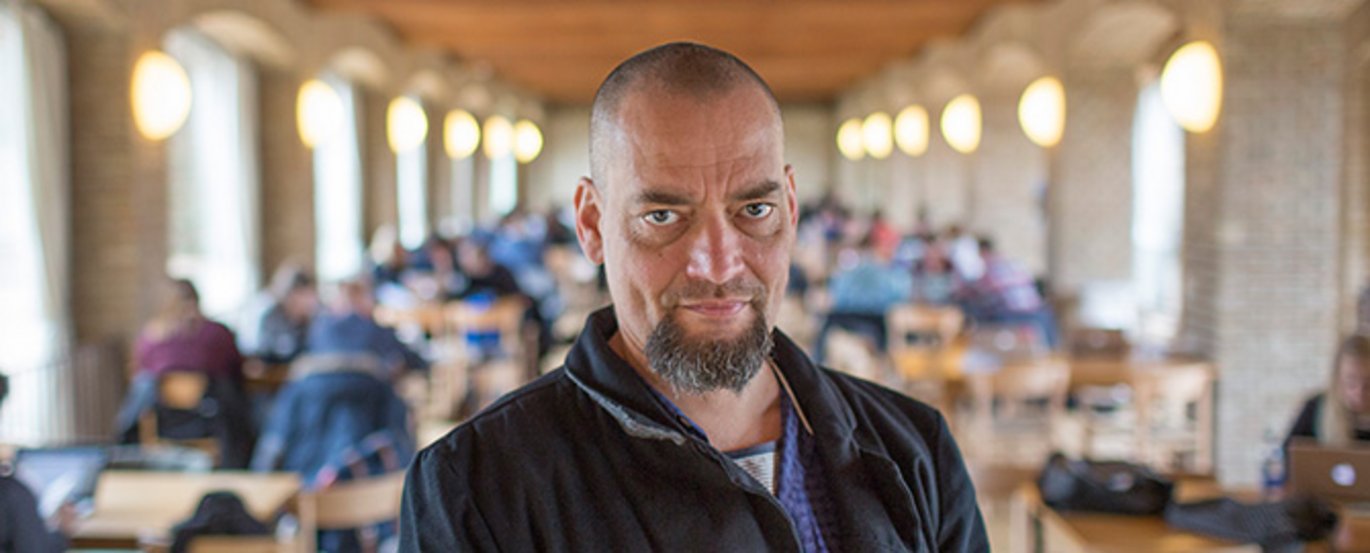THEME: Student chaplain all too familiar with the pressure to get good marks and the lack of solidarity
An increasing number of students are seeking out the student chaplain at Aarhus University. Many of them come because they feel trapped by the pressure to get good marks and by their study environment.

Perfectionism and a university education are a bad combination according to student chaplain at Aarhus University, Jens Munk. Omnibus sat down for a chat with the student chaplain. In the very same chair that around 6,000 others have sat in during the eight years that Jens Munk has been employed at AU.
“As human beings, we’re all subject to the same mechanisms, so the topics that the young people come here with are therefore very similar. Perfectionism really plays a big role," says Jens Munk.
Many students come because they feel under pressure due to mark requirements and because of the mutual competition on their degree programmes. If they are also affected by a death or serious illness among their nearest and dearest, then the combined pressure becomes too much.
"It’s often a case of finding some strategies for survival and overcoming their perfectionism," he says.
Almost a third of all his conversations have perfectionism as the focal point. Of the remainder, one third result from factors such as death, loss and grief, while the final third are about all sorts of other things.
Jens Munk almost only talks to young people who are having a really hard time. Which is how it has always been. What is new is that more young people than previously have problems with the pressure to get good marks and with the study environment.
"Perfectionism is one of the difficult issues, because the desire to do everything perfectly applies to all parts of life, and what I see here is a development that’s going in the wrong direction," says Jens Munk.
He points out that perfectionism almost only affects women.
"Most boys get through their school and upper secondary education with long periods of time and multiple subjects where they’re well aware that they aren’t on top of their studies. They’re used to that feeling and they’re not afraid of it," says the student chaplain.
He believes that the young men are therefore better prepared to deal with the uncertainty of a degree programme in which the amount of reading material, assignments, social requirements and their own and their family’s demands are impossible to satisfy all at once.
Drop out despite good marks
On the other hand, many girls have completed their schooling in the knowledge that they are in control of their syllabus, homework and presentations. But when they meet the requirements of a university degree programme – combined with all the other things they want to do – the uncertainty and identity crisis begins.
"Because who is going to be the most talented girl? If there are twenty in a class and all of them come with that identity, then they run the risk of competing and comparing themselves to one another to such a degree that they simply can’t cope," says Jens Munk.
He knows many young women who have dropped out of a degree programme that they could have completed academically.
"They feel terrible and can’t stand being part of the study environment that they belong to. Some departments are better to deal with these things than others, so it’s possible to do something about this issue," says the priest.
The big trend
He sees competition between people as a fundamental condition, and he underlines that the students must, of course, compete to get the best marks, the best jobs and to have the best future.
"The problem is that solidarity and the ability to support and help each other is missing in some places," says the student chaplain.
In his experience, more students feel under pressure because of mark requirements than previously.
"Marks are a problem, because things get serious if they are too low. Students fail exams and they don’t have the same opportunities for another chance as they did before."
This means that the individual student is hit hard if death and illness in the family also has to be dealt with during a degree programme.
University chaplains starting a new conversation café
In the Student House, the student chaplains are readying a new initiative for the students: A conversation café – about the difficult topics, such as the challenges of a degree programme, though the big existential questions are also allowed. The groups will be small – probably around five people in each group.
Participants decide the topic for the conversation. The groups will be facilitated by Tine Holst Agerskov, who is employed as project manager for the student chaplains at Aarhus University. Participation is free and the project will run for four years starting in spring 2016, with the first café taking place in April.
The precise form of the café is still to be determined together with the students who have agreed to participate in the preliminary work.
Find out more at the student chaplain website (in English) and contact Tine Holst Agerskov if you are interested in participating or would just like more information.
Translated by Peter Lambourne.

